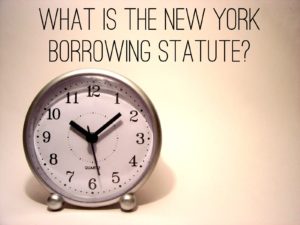By: Robert J. Nahoum

THE PROBLEM:
You have been sued by a debt collector and timely answered the lawsuit. You are now preparing your defense. The debt is old and you suspect it may be too old to sue on.
How do you calculate the statue of limitations in a New York Debt Collection Case?
THE RULES:
There is a time limit in which a debt collector can sue to collect a debt.  This time limit is called the “statute of limitationsâ€.  The statute of limitations for filing a debt collection lawsuit under New York law for a “consumer credit transaction†is 6 years. However, New York law does not necessarily apply.
Often, it can be difficult to tell at the outset of the case what statute of limitations applies. New York State law, CPLR §202, provides that when a foreign entity sues a New York State resident on a claim that accrued outside the state of New York, courts must apply the foreign state’s statute of limitations if it bars the claim. CPLR §202 is referred to as the “Borrowing Statute†because it borrows the foreign state’s statute of limitations.
Debts that accrue to a foreign corporation are deemed to accrue in the state where the creditor resides and sustains economic injury. A corporation is said to reside in the state of its principal place of business or its state of incorporation.
Many credit card companies are incorporated in states other than New York, such as Delaware and elsewhere, and many of these states have shorter statutes of limitations than New York’s 6-year law.  For example, Delaware has a 3-year statute of limitations on contracts.
The statute of limitations clock begins to run from the “date of the default.†For most credit card cases, the “date of the default†is about 30 days after you last made a payment.  If you made a payment at any time after you first stopped paying, the debt collector’s time to sue you starts to run again.
Expiration of the statute of limitations does not prevent the debt collector from trying to collect the debt; it just precludes them from suing you for it. Under recently enacted New York debt collection laws, if the debt collector is trying to collect a debt with an expired statute of limitations, it has to tell you that it is too old to sue.
Federal debt collection laws called the Fair Debt Collection Practices Act (FDCPA), regulates the collection of consumer debts. The FDCPA precludes third party debt collectors from using false, misleading, deceptive and harassing debt collection tactics.  Suing on a debt that is beyond the statue of limitations is a violation of the FDCPA.
If a debt collector violates the FDCPA, you can sue for statutory damages up to $1,000.00 plus actual damages (like pain and suffering) and your attorney’s fees.
WHAT YOU SHOULD DO:
If a debt collector has sued or threatened to sue on a debt which you believe is beyond the statute of limitations, try to determine where the claim accrued by discovering where the original creditor is located and then determine what the statute of limitations is for that state.
If it turns out the debt was time barred, you may have a claim against the debt collector and its lawyers under the FDCPA.  If you’ve been the victim of an FDCPA violation, you can sue the debt collector for statutory damages up to $1,000.00, actual damages (like pain and suffering) and the debt collector may have to pay for your attorney.
If you need help settling or defending a debt collection law suit, stopping harassing debt collectors or suing a debt collector, contact us today to see what we can do for you. With office located in the Bronx, Brooklyn and Rockland County, the Law Offices of Robert J. Nahoum defends consumers in debt collection cases throughout the Tristate area including New Jersey.
The Law Offices of Robert J. Nahoum, P.C
(845) 232-0202
